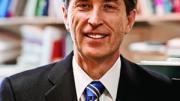In the wake of the murder of more than two dozen children and adults in Newtown, Connecticut, in December, the Harvard School of Public Health (HSPH) and Reuters sponsored a forum at the school on “Gun Violence: A Public Health Crisis” on January 8. Reuters correspondent Scott Malone moderated the conversation, in which professor of health policy and management David Hemenway (HSPH), professor of child psychiatry Felton Earls (Harvard Medical School), Loeb University Professor Laurence Tribe, a constitutional law expert, and senior lecturer in public policy David King (Harvard Kennedy School) discussed both the status quo as a public-health issue, and interventions that could protect Americans, young and old, from more deaths by firearms.
Hemenway, one of the nation’s leading authorities on gun violence, directs the Harvard Injury Control Research Center. A recent New York Times editorial referenced his research on guns (see “Death by the Barrel,” an article from the Harvard Magazine archives focused on his book Private Guns, Public Health), and in a January 7 essay in the online Journal of the American Medical Association, he and coauthors Dariush Mozzaffarian, associate professor in the department of epidemiology, and David Ludwig, professor of pediatrics, suggested that the country attack the firearms problem in a manner similar to that used in previous decades for the public-health problems of smoking and auto deaths. (Hear him interviewed by Sascha Pfeiffer of WBUR radio in Boston about that article.) “The United States has a horrific gun problem,” Hemenway asserted at the forum. “Compared to other developed countries, we have the most guns, the weakest gun laws, and so many more homicides.” He noted that an American child had 13 times the likelihood of being murdered by a gun as a child in other developed countries. “God forgive us,” he said, “if we do nothing and allow our children to die.”
“Violent behavior is learned behavior,” said Earls. “It is reflected in the brain but is not carried by genes. We have done a good job of changing social norms with respect to child abuse. Now we need to broaden this to include exposure to violence.”
Tribe urged action because “the current window of opportunity may not last.” He noted that “violent videos are not uniquely available in the United States. What distinguishes us is our astonishingly relaxed and loophole-laced laws on guns.” The Second Amendment is actually the friend of those who seek stronger gun laws, Tribe said, because it disqualifies the “slippery slope” argument that any regulation of guns will eventually end private gun ownership. “The government is not constitutionally capable of disarming everybody,” he asserted.
“I believe we are not going to make a lot of progress [on guns] in Congress anytime soon,” said King, who noted that "96 percent of the funding that went towards gun-control measures went to Republicans in the last election cycle." In the polity, he said, citizens hold to their preferences with “differing intensities,” and he challenged the audience to consider what they want from democracy: “Is a democracy supposed to reflect the majority opinion, or should a democracy also weigh the intensity of people’s preferences?”
The event was webcast live and is available at the HSPH website for The Forum at Harvard School of Public Health, which seeks to “provide decision-makers with a global platform to discuss policy choice and scientific controversies, allowing participants to leverage their collective knowledge.”









